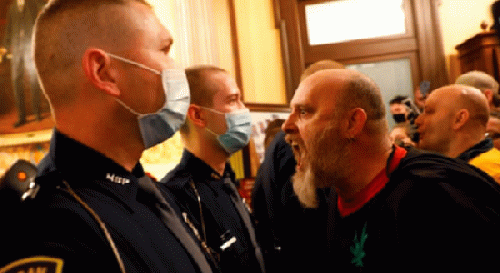
. Only white men were supposed to have the right to bear arms
(Image by Jonathan Cook Blog) Details DMCA
Here is one thing I can write with an unusual degree of certainty and confidence: Minneapolis police officer Derek Chauvin would not have been charged with the (third-degree) murder of George Floyd had the United States not been teetering on a knife edge of open revolt.
Had demonstrators not turned out in massive numbers on the streets and refused to be corralled back home by the threat of police violence, the US legal system would have simply turned a blind eye to Chauvin's act of extreme brutality, as it has done before over countless similar acts.
Without the mass protests, it would have made no difference that Floyd's murder was caught on camera, that it was predicted by Floyd himself in his cries of "I can't breathe" as Chauvin spent nearly nine minutes pressing his knee to Floyd's neck, or that the outcome was obvious to spectators who expressed their growing alarm as Floyd lost consciousness. At most, Chauvin would have had to face, as he had many times before, an ineffectual disciplinary investigation over "misconduct".
Without the current ferocious mood of anger directed at the police and sweeping much of the nation, Chauvin would have found himself as immune from accountability and prosecution as so many police officers before him who gunned down or lynched black citizens.
Instead he is the first white police officer in the state of Minnesota ever to be criminally charged over the death of a black man. After initially arguing that there were mitigating factors to be considered, prosecutors hurriedly changed course to declare Chauvin's indictment the fastest they had ever initiated. Yesterday Minneapolis's police chief was forced to call the other three officers who stood by as Floyd was murdered in front of them "complicit".
Confrontation, not contritionIf the authorities' placatory indictment of Chauvin - on the least serious charge they could impose, based on incontrovertible evidence they could not afford to deny - amounts to success, then it is only a little less depressing than failure.
Worse still, though most protesters are trying to keep their demonstrations non-violent, many of the police officers dealing with the protests look far readier for confrontation than contrition. The violent attacks by police on protesters, including the use of vehicles for rammings, suggest that it is Chauvin's murder charge - not the slow, barbaric murder of Floyd by one of their number - that has incensed fellow officers. They expect continuing impunity for their violence @rob_bennett - 'overhead'.
Similarly, the flagrant mistreatment by police of corporate media outlets simply for reporting developments, from the arrest of a CNN crew to physical assaults on BBC staff, underlines the sense of grievance harboured by many police officers when their culture of violence is exposed for all the world to see. They are not reeling it in, they are widening the circle of "enemies" @AleemMaqbool.
Nonetheless, it is entirely wrong to
Today, little has changed substantively, as should be obvious the moment we consider what would have happened had it been black militia men that recently protested the Covid-19 lockdown by
Brutish violence
(Note: You can view every article as one long page if you sign up as an Advocate Member, or higher).





